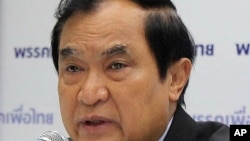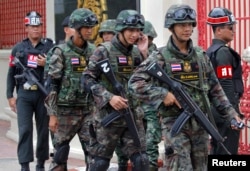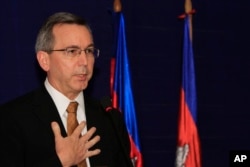The leader of a new group to restore popular sovereignty in Thailand following a military coup is speaking out about his fledging effort to restore democracy through non-violent action.
One day after forming a democracy movement in exile, the former interior minister of the deposed Thai government is encouraging the junta’s leader to talk with him.
Jarupong Ruangsuwan, who headed the Pheu Thai Party until Sunday, says General Prayuth Chan-ocha should reason with those opposing the coup for peace in the kingdom and to benefit all of its people.
Jarupong tells VOA that true victory to rid Thailand of its latest military government may take a long time but he will pursue it “through non-violent means just like Gandhi and the Dalai Lama.”
The prominent, longtime Thai politician announced via social media on Tuesday the formation of the Organization of Free Thais for Human Rights and Democracy (FT-HD).
Jarupong, in a 45-minute interview via Skype, spoke with VOA News Wednesday from an undisclosed location outside Thailand. He said he would not say where he is because that would put his life in danger. Jarupong has defied an order by the junta to turn himself in for interrogation and is currently considered a fugitive by the military, which has established a special team to search for him.
No connection with Thaksin
The FT-HD leader denies the group has any connections with ex-prime minister Thaksin Shinawatra who was deposed in the previous coup in 2006. Thaksin, a billionaire, has been in exile for years and has helped fund the parties which have won every national election since 2001.
Supporters and opponents of the May 22 coup say one aim of the military intervention is to try to rid Thailand permanently of Thaksin’s political influence.
Jarupong says in the face of guns and bullets possessed by the army his non-violent Free Thai organization cannot fight on its own and will need outside support.
Jarupong rejects the findings of an opinion poll taken in the past week showing widespread support for the coup and General Prayuth as the favored candidate to be prime minister.
Jarupong says the poll is a “mere joke,” a reflection of a “state of fear.” Thais nowadays, he says, dare not voice their true opinions. If the army chief is so confident of his popularity, Jarupong asks, why not hold elections soon?
General Prayuth has stated that elections cannot be held for a year or more until the process of widespread reform is implemented.
An interim, appointed government is expected to be put into place within several months. At present, General Prayuth holds all executive and legislative powers and has abrogated Thailand’s constitution except the article recognizing the King as head of state.
Challenge for US
The coup, Thailand’s 19th successful or attempted putsch by the military since the end of the absolute monarchy in 1932, has been condemned by many countries, including the United States.
The U.S. government this week suspended more assistance to Thailand in response to the coup and is considering moving the major regional “Cobra Gold” military exercise out of the kingdom.
Scot Marciel, the principal deputy assistant secretary of the State Department’s East Asian and Pacific affairs bureau, during Congressional testimony on Tuesday expressed pessimism about a quick restoration of democracy as was seen after the 2006 coup.
“Recent events have shown that the current military coup is both more repressive and likely to last longer than the previous one.”
The American official notes the junta’s media censorship and the summoning, detention and intimidation of hundreds of people, including politicians, academics and journalists.
Marciel predicts the atmosphere of repression will not result in the promised political reconciliation touted by the junta chief. He also told the House Foreign Affairs Subcommittee on Asia and the Pacific that if freedoms and elections are not restored "over time there will be more and more Thai people who will look for opportunities to express their unhappiness.”
During the hearing, lawmakers from both parties spoke warmly about Thailand and its long alliance with the United States. But they expressed support for the Obama administration’s suspension of aid and military exercises with Bangkok after the junta took power a month ago.
The military takeover came after months of protests against the elected government and years of political turmoil.








